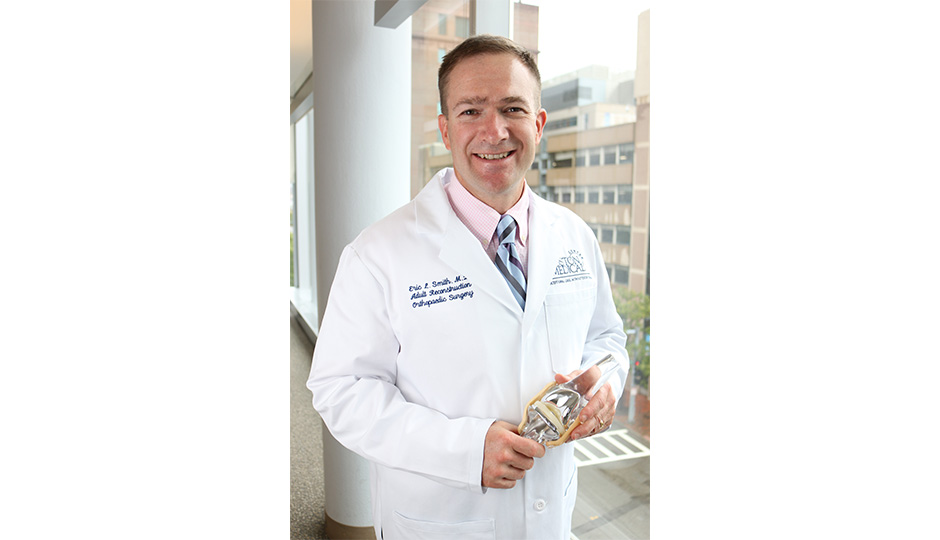Anterior Hip Replacements- a Better Alternative for Many Patients
Hip pain is a common symptom with a number of possible causes. Some studies indicate that people aged 60 years and older report having had significant hip pain on most days over the last six weeks. For some, pain is increased during and after use (particularly weight-bearing activity), but improves with rest. This is usually indicative of a structural joint problem, such as osteoarthritis.
When a patient is referred to an orthopedic surgeon for hip pain, careful evaluation often reveals it is really their back that is causing the problem. It could be a pinched sciatic nerve resulting from a herniated disk in the lumbar spine and it’s radiating to the hip. Lower lumbar spine nerve roots refer pain to the buttock and hip area as well. Other times, knee pain is really symptomatic of a problem in the hip. “There are many joint forces acting on the hip,” said Dr. Eric Smith, of Boston Medical Center (BMC). “The hip bone is connected to the, well, just about everything you do.”
Dr. Smith, a fellowship-trained adult reconstructive orthopedic surgeon at Boston Medical Center is an expert in primary joint reconstruction, revision joint reconstruction, and arthritis. He specializes in various types of hip and knee surgery, including replacements, resurfacing, total joint replacement in bariatric patients, and total hip arthroplasty using anatomic femoral heads – replacement parts that mimic the size and shape of the actual hip joint.
With traditional hip surgery, patients typically spend days recovering in the hospital and may need additional time in a rehabilitation center. For patients having a hip replacement for the first time, Dr. Smith performs a direct anterior approach which is relatively new procedure. There are lower complication rates and decreased length of stay – patients go home on the same day!
Hip replacement, formally known as total hip arthroplasty, is considered one of the most effective surgeries in medicine, enabling the vast majority of patients to walk again pain-free. More than 340,000 of the operations are performed in the U.S. a year and include a growing number of patients in their 40s and 50s who want to maintain an active lifestyle. Dr Smith sees patients of all ages, though most are in their 60s. He performs 80% of his hip replacements using the “anterior approach” by making a four-inch incision in front of the hip, close to the groin, before going in to install the new joint. The procedure is performed through what he calls a “natural interval,” or opening between muscles, thereby avoiding cutting through muscle and tendons as with the conventional posterior approach.
Because the operation spares muscles, patients don’t need to limit their movements during the recovery period. They can bend over and reach down to the floor. They can cross their legs — all things that patients with a posterior approach have to be careful about for a while because they can dislocate the hip. Most patients go back to work in a week and are walking without assistance in 2-3 days.
Most (80%) anterior hip replacements last for 15-20 years, and should allow most people to return to normal, pain-free activity. Younger, more active patients often get cementless hip replacements and these may last longer, although this isn’t confirmed in long-term studies. No surgical procedure is right for everyone, and every individual is unique. Hip replacement sometimes has to be done through a traditional approach and that is still a very reliable and satisfying surgery for the patient. So discuss with your surgeon whether hip replacement is right for you, and subsequently, which approach is best for you.
To learn more about Dr. Smith’s work or Boston Medical Center’s Orthopedic Surgery Center, click here or call 844-830-3973.
Dr. Smith is a member of several professional organizations, including the Boots on the Ground Advocacy Program, the Eastern Orthopedic Association, the American Association of Hip and Knee Surgeons, the Massachusetts Orthopedic Society, and the American Academy of Orthopedic Surgeons. A four-time recipient of the Army Commendation Medal, Dr. Smith has received numerous honors and awards during his career, including the Meritorious Service Medal, the Global War on Terror Medal, and, in 2015, he was named among “Boston’s Best Orthopedic Surgeons” by Boston Magazine.
This is a paid partnership between Boston Medical Center and Boston Magazine



